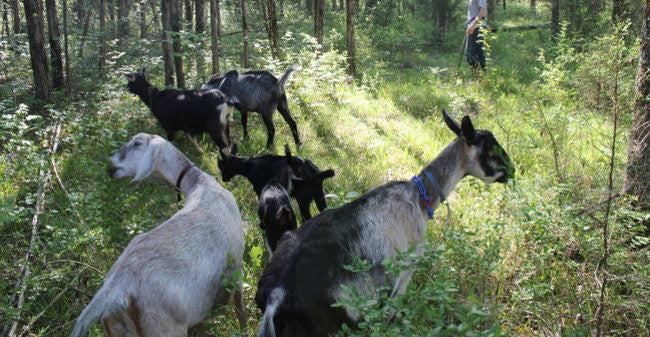
When we came to the farm a month ago it was the perfect time to be looking for some milking does and their baby goat kids. Most goats are bred to have kids in the Feb/March/April time frame, so we started contacting people in December and January about availability for March. Our mission was to find some milking does and kids that we thought would thrive on our farm.
There's a lot that goes into the beginnings of a herd, so I’ll talk about a few of them in no particular order. One of our primary hopes was to find goats from Tennessee (or at a minimum from the South.) By focusing on goats in TN we were hoping to find animals acclimated to our climate, and our parasites. It’s stressful enough to move an animal from one location to another, let alone take it to an entirely different climate, so we tried to keep our animal purchases local. If a goat has lived in our climate previously then it’ll have a better chance at surviving in our climate in the future. It can get hot and humid in TN, which is different from a state like Vermont or Oregon. It didn’t make a lot of sense to us to seek out goats from that far away if we could source them locally. As we expand the herd this may be a more difficult task (and we may want to expand our genetics eventually), but we hope we to keep our livestock purchases as local as possible.
Along the same lines, we wanted to find goats that were accustomed to browsing and foraging. Since we eventually expect them to forage the majority of their own food this is an important trait. If the goats were good browsers, and also from TN, there would be a reasonably high likelihood that they had been browsing similar forages to ours.
 Walking the goats through the woodlands, or as Sweetbreads likes to call it: The Enchanted Forest
Walking the goats through the woodlands, or as Sweetbreads likes to call it: The Enchanted Forest
Not to be forgotten are milking records and overall animal health/care, which of course are near the top of the list, if not at the top. Health and productivity go without saying as critical variables, but for amateurs like us it can be a little difficult to discern healthy from mildly sick animals. It’s also pretty hard to get a high quality milking doe from someone, since that’s the whole reason they have a milking doe in the first place.
So far we’ve done an OK job with the goats (we think), but we did go through some turmoil with one of the chickens we brought home a couple weeks ago. It turned out to have a respiratory illness that has been a little frustrating over the past few weeks. Fortunately, we think we caught it early and it hasn’t spread. Hopefully it stays that way. It’ll take a few of those experiences to learn, which is why we’re starting small and at a reasonably slow pace. Better to learn about a disease with one animal than one hundred animals.
So today we have five goats, five guineas, 4 chickens and couple dogs. All are from TN except our guard dog, Sophie. Among the goats we have 4 ladies and one gentleman: two milking does, one yearling doe, one doeling, and one buckling. Over the course of the next month or two we may add a couple more goats, but so far that’s the beginning of Little Seed’s Tennessee goat herd.
My next big mission is finding some pigs. After all, what kind of Scrapple would I be without pigs?



